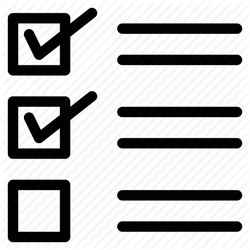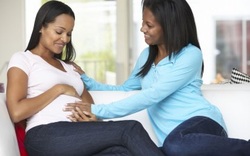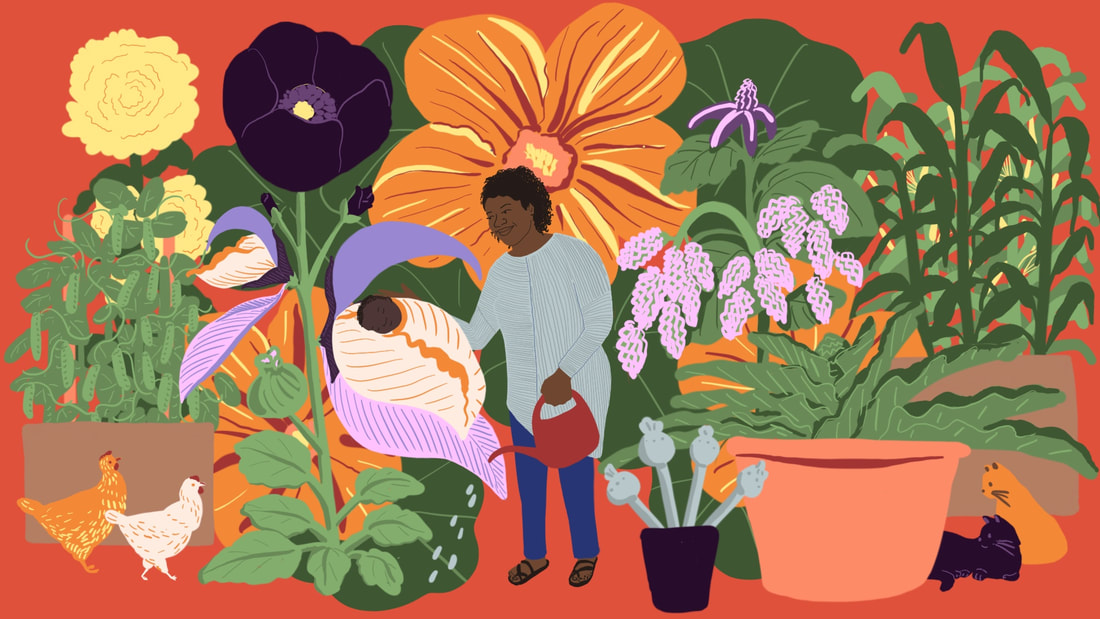|
Davis has been a doula for six years and says she’s helped more than 20 individuals and families give birth. A self-described “black, Jewish, dyke,” her training started in Brooklyn, New York where she realized she didn’t want to be a midwife. She decided instead to become a doula.
Doulas provide a wide range of pregnancy and childbirth support, which can include childbirth education, prenatal and postpartum care. “I like to say a doula is from the waist up, and a midwife is from the belly button down,” Davis explains. Though doulas are not medical professionals, some parents and moms are turning to midwives and doulas instead of traditional hospitals for more support during the birth process. While Davis warns they’re not the magic wands to a perfect birth, she believes there’s a doula for everyone. “If you want an Asian doula, there are Asian doulas,” Davis says. “If you want a free doula, there are tons of free doulas. If you want a trans person, there’s trans doulas. There’s literally a doula for everyone.” Part of Davis’ appeal to clients is her intersectional identity as a black, gay, Jewish woman. She says she has shared the same experiences that queer parents face and recognizes the fears some women of color have about maternal health, which can make her clients feel safer. Read the rest on NPR. Big thanks to Esmy Jimenez for this feature
0 Comments
 I pride myself on being a black, queer Jewish doula, but does that mean I'm the right doula for someone who, say, identifies as a white, heterosexual Christian? Yes, maybe.
According to an article about Black Midwives in the LA area, "Nationwide, black women are at the greatest risk of pregnancy-related death, have the highest rates of C-sectionsand, compared with whites, black infants are four times as likely to die of complications at birth and twice as likely to die before their first birthday." This disparity in maternal care along racial lines is something that can't be ignored. When a woman of color in the hospital birthing system is possibly surrounded by doctors and nurses who don't look like her, having a black doula to help her advocate for herself can be the difference between a natural birth and an emergency c-section. I want to be clear that this isn't to say that a white doula couldn't provide a woman of color care that is just as comprehensive and caring, it's just different. A black doula shares a similar life experience as her black client, even if they come from two separate worlds. So what about religion? Is it important that my doula matches my personal religion? Again, I can't say, though I've personally doulaed for couples who shared my religious background and those who did not. For some, the religious/spiritual aspect of birth is important. It can mark a new life cycle event that requires special prayers or affirmations be recited. Having a doula who is familiar with those rituals can be helpful. For others, birth is just a part of life that doesn't hold any specific religious significants, but has a spiritual element that a doula can help facilitate. Mother blessings, placenta burying, and similar are all rituals that a doula can help plan. Lastly, what about sexual orientation. Would it be weird to have a lesbian doula at my birth if I'm not a lesbian myself? Again, I can't answer this question for anyone. However, I will say that all of my clients to date have been straight couples or single women and it hasn't been an issue. Like race and religion, having a doula who understands differing pronouns, gender presentation, language, and processes can be helpful for couples and singles in a hospital setting, where awareness and sensitivity may be limited. So what does this all mean? Should I only accept clients who are like me? No, not at all. I love that my client base has been an incredibly diverse mix of single women, couples, friends and strangers. I love that I've been able to whisper tehillim (Psalms) while a woman labors and mimic "Thank you, Jesus" when an exhausted mother holds her baby for the first time. I always encourage clients that I meet for consultation to interview at least two (or more) doulas to find the one that "fits". And if the one that fits happens to be similar to you, great. If the doula does not, well, that's great too. 02/5/14 by Crystal Azul
I grew up hearing stories about births and deaths from my mom, who was raised in a poor, evangelical home in Mexico. My mom would tell me the story of her nephew Esteban’s birth. It happened during the middle of a hurricane, the water had risen a foot into the tiny house, and my mom’s cousin was in active labor. Baby Esteban, nearly having a water birth, came out of his squatting mother like a slippery fish, caught by my mom’s capable hands. When my friends started having babies, I became actively interested in birth justice work, especially after hearing their stories of unnecessary interventions, lack of communication from hospital staff about procedures, and the feelings of being too overwhelmed to make an informed decision during labor. As a feminist, womanist, and queer POC, I understood all too well the importance of advocacy during times of medical vulnerability. In 2011, I finally trained as a doula in Arcata (Humboldt County) and had my first client – a 17 year old woman who found me on a volunteer doula list through the Family Practice Nurses who worked with mothers on WIC. After this first experience of working for my client and representing her wishes, I knew that would never want to work for a hospital or similar institution and began searching for ways to be a doula in community. Last August, I attended SQUATfest, a conference for people working in birth/reproductive justice and held at the Women’s Building in SF. As can be expected, the conference was predominantly white and cis, though some effort had been made to offer scholarships for low-income/POC birth workers. For many (qt)poc folks, accessibility with regards to affordability is one of the biggest obstacles to becoming a doula or hiring a doula. (There is a movement to include doula services through Medi-Cal, and there are volunteer doula programs in select hospitals that provide doulas for those who qualify as low-income.) During SQUATfest, I spent time in the Doulas & Midwives of color circle. There were many conversations about working in mostly white and privileged spaces, bringing services and support to communities of color, and burn-out being a major issue for (qt) POC birth workers. Some of the newer birthworkers discussed finding it challenging to “connect with birthworkers of color for mentorship because they are too done, tired and are moving on, have too much risk/responsibility already on their plate, or are homophobic/transphobic.” I had the privilege of hearing the wisdom of such birth justice workers as Midwives Makeda Kamara, Claudia Booker, and our local Certified Professional Midwife Laura Perez from Sacred Birth Place in Oakland. Keep reading  By JOSIE PICKENS WriterAs far as I’m concerned, there is always country for Erykah Badu, whether she’s blowing us away with her genre- and spirit-shifting music, keeping it real by admitting what we all know about the state of hip-hop, or reminding us that reading is fundamental by clapping back at disrespectful detractors on social media. My favorite side of the entertainer, however, is when she speaks about doulas and natural birth. In an interview last year with Origin magazine, Badu opened up about why she became a doula: “I kind of felt like, I like being the welcoming committee. I just continued to be present at different people’s births, and I started studying on my own, different techniques, and the variables of what being a doula is about. I learned to originally be like water, in the place that I was, so that I could be a container for whatever they need. I love being of service in that way. I’m an official doula, and I am working to get my midwifery license right now.” I’m particularly attached to the natural birth narrative because I have “baby catchers” in both my maternal and paternal familial lines. I know that home births and midwifery aren’t for everyone. But I do believe the work of doulas is exceptionally important, a mostly forgotten aspect of the healthy pregnancy and birth story—a part that many Black women have forgotten are a significant part of our history. So what is a doula, exactly? According to DONA International: “The word ‘doula’ comes from the ancient Greek, meaning ‘a woman who serves,’ and is now used to refer to a trained and experienced professional who provides continuous physical, emotional and informational support to the mother before, during and just after birth; or who provides emotional and practical support during the postpartum period.” Doulas are essentially “team mommy” personnel. Their only responsibility is to assist mothers with being comfortable, safe and aware during the birthing process. Also, because doulas have birthing experience and training, they ensure that mothers-to-be are well informed about all that happens before, during and after giving birth. (Trust me, as a mother who had a very difficult pregnancy, there is a lot to know. It’s overwhelming how much.) Giving birth can be a difficult, frightening experience, especially for first-time mothers and mothers who experience complicated births. A lack of knowledge, and the nervousness and stress that comes during labor and delivery, can make giving birth extremely tedious and complicated. An extremely interesting aspect of doulas and Black women is the perception that it’s a ‘White granola’ thing to do. At one point, most of the midwives in the U.S. were Black. Having a doula hold a mother’s hand, interact with medical staff on her behalf, and help her breathe and push—all while providing patience, information and instruction—can definitely make the birthing process less difficult, briefer and safer. Less difficult births mean healthier babies and mommies, and that is the power doulas offer the world. I thoroughly enjoy reading tweets from @thepbg (a.k.a. Cashawn Thompson) as she chronicles her life of caring for young children. Thompson is also a practicing doula. When I asked her why she chose to take up the practice, she said, “We are living in a time where a lot of pregnant women find themselves alone and without a partner during pregnancy and birth, for any number of reasons and personal choices. That doesn’t mean they don’t need support. Doulas provide educational and emotional support during pregnancy and birth, which is empowering and absolutely necessary. It sets the tone for how one sees herself in the role of a parent, how effective she can be and how she will eventually parent her child.” Some may ask, if being a doula is such a benefit, why have Black women shied away from the practice? Freya Morani—doula, breast-feeding educator and creator of rootmama.org—believes Black women have disconnected from their ancestral attachment to midwifery and doulaing. “An extremely interesting aspect of doulas and Black women is the perception that it’s a ‘White granola’ thing to do,” she says. “Black women don’t know their legacy of midwifery and birth assistance. At one point, most of the midwives in the U.S. were Black. We’re far removed.” As a doula, Morani says she’s dedicated to serving Black families, particularly Black mothers, who are up to four times more likely than White mothers to die from complications during child birth. Looking back, I wish I’d have enlisted the services of a doula during my pregnancy and birth. It might have alleviated some of the stress I experienced as a first-time mom. If I decide to give birth again, I’ll surely have a doula by my side. Read more at EBONY http://www.ebony.com/life/doulas-and-black-motherhood-888#ixzz2rtzBTTMy Follow us: @EbonyMag on Twitter | EbonyMag on Facebook |
Details
AuthorHi there! I'm Erika Davis and I'm a doula working in the Seattle and South Puget Sound area. Archives
December 2018
Categories
All
|

 RSS Feed
RSS Feed